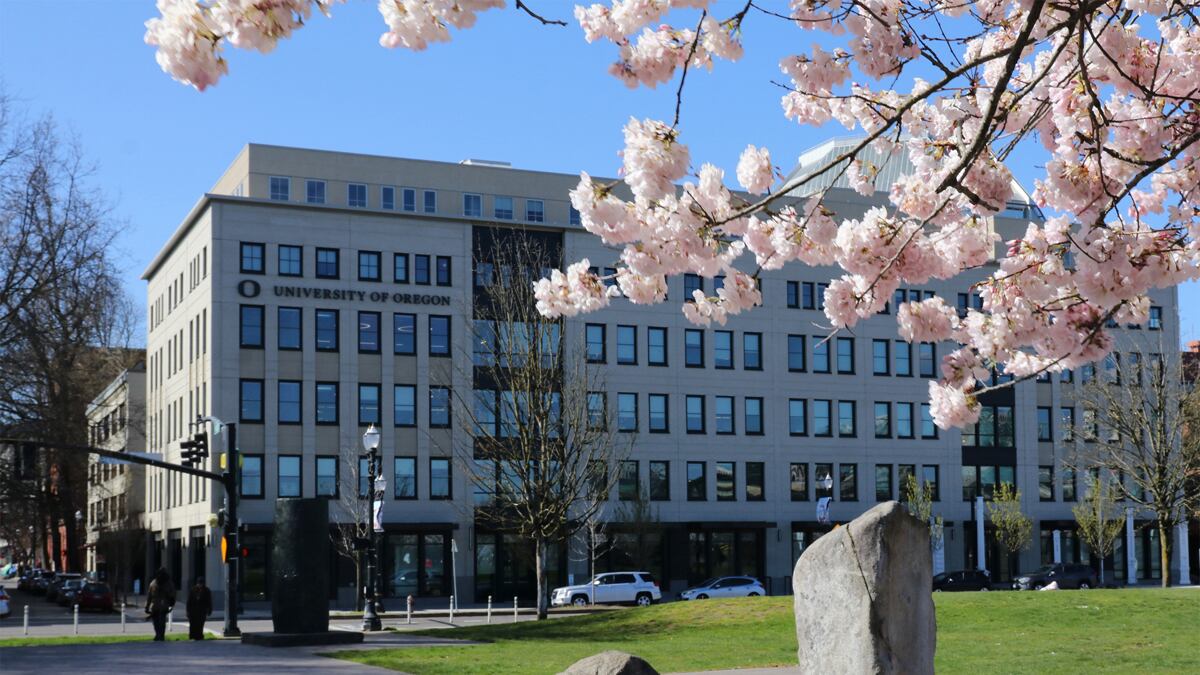At the University of Oregon's Lundquist College of Business—consistently ranked among the best public business schools in the country—the "traditional" path isn't a prerequisite.
Unlike a traditional full-time MBA, the UO's executive MBA program, based in Portland, is strategically designed for midcareer professionals whose careers demand flexibility. At the Oregon Executive MBA, students are able to work full time while earning a graduate degree in 20 months, minimizing time away from work and family with thoughtfully scheduled class times and summers off. With executive coaching, an in-person cohort model, a global trip for all students and the opportunity to pursue individual interests through the thesis-like capstone project, executive MBA graduates are uniquely positioned to accelerate their professional growth while maintaining—and often even growing—career momentum.
Meet five professionals who are redefining what it means to be a business student.
Ericka Warren, MBA '19
Equity Consultant

For Ericka Warren, a former professional vocalist, what she would do after business school wasn't clear when she began the Oregon Executive MBA program in September of 2017. Warren, 49, had long careers as an executive administrator and a touring musician, which gave her business acumen, leadership and management skills and an understanding of the creative side of corporate development. At UO, she took courses on the essentials of marketing, finance and statistics.
"For me, being an older student and being a student that wasn't a traditional business major, I hadn't learned all of those foundational concepts in a traditional educational setting," Warren says. "The degree definitely has sharpened my skills in those areas and given me some refreshers."
For her capstone project, Warren took on the challenge of developing strategy for the University of Oregon's new Black Cultural Center, which was still in the planning stage. This was one of several experiences that left her with a strong sense of career direction. Today, in addition to volunteering as president of the UO Black Alumni Network, Warren works as an equity consultant and counts among her clients the I-5 Rose Quarter improvement project.
The flexibility of the executive MBA program was critical for Warren, who is a single mother to a 9-year-old daughter.
"Going through the process [of the executive MBA program] while I was working two full-time jobs and being a mother, I think that lends to my ability to be able to juggle projects well and balance priorities," she says. "I'm a better person for it."
Andy Cameron, MBA '20
Parks Management Analyst

Andy Cameron, 41, a parks management analyst for Washington County, thought his educational background in psychology would have him "swimming upstream" if he decided to get a business degree.
"I had never even taken a business class and never had any desire to do so back in my younger days," Cameron says. "It was maybe halfway through the first term that it became pretty apparent that the program accommodates—and even expects—folks like me to be there."
Cameron enrolled in the Oregon Executive MBA program knowing that a business degree was a useful way to advance in state government. His capstone project centered around the ways in which advancing technology are likely to disrupt the parks system. While he does not graduate until later this May, the program has already paid off: His research now has him collaborating with leaders at the National Parks and Recreation Association.
"Some of those [conversations] became lasting dialogues," Cameron says. "That was kind of a fortuitous turn that never would have really happened without needing to talk to these folks for capstone."
Mele Sax-Barnett, MBA '20
Director of Customer Engineering, Airship

After nearly six years in the technology sector, Sax-Barnett, 37, decided that her professional ambitions had outpaced her educational background.
Sax-Barnett, who earned a philosophy degree as an undergraduate, has a good job with a local tech startup, but her curiosity and analytical mindset pushed her to enroll in the Oregon Executive MBA program. And the convenience of the program, along with the Lundquist College's convenient facility in Old Town Portland, made it doable with a family and full-time job.
"I [realized that] without further education I could probably make it up to director level at some point, and that's about it. And I [asked myself], am I OK with that?" she says. "And the more I thought about it, I was like no, I want to try to do something else."
The emphasis on student collaboration at the Oregon Executive MBA was especially appealing, as well as the opportunity to study business overseas on a global study trip. Reflecting on her professional trajectory, Sax-Barnett believes that she made the right choice in waiting to pursue a higher degree, in part because of the confidence it has given her as a leader.
"I would have been much less prepared as a new graduate from an undergrad program that I was starting when I did, because I had all that real-world experience from working at different companies doing different things," she says.
Maria Langbauer, MBA '20
Assistant Planner, City of Gresham

When Maria Langbauer entered the Oregon Executive MBA program, she was hoping to develop skills to begin a nonprofit in her home country of Brazil. Over the course of the program and through its emphasis on self-reflection, she discovered a new passion—entrepreneurship.
"The program [gave me] access to a lot of different individuals," Langbauer says, pointing out that UO also has an extensive network of alumni. "I was able to figure out that I was really drawn to fields of innovation, technology, and entrepreneurship."
For Langbauer, this has involved developing a business plan for a startup that manages private campgrounds, focusing on accessibility, that she hopes to pursue when she graduates this spring.
The fact that Langbauer did not have an undergraduate degree in business was never an obstacle.
"To me it was like being on an adventure where you're constantly trying new things to see if they fit with you," she says. "The professors make the concepts very easy for any student to understand, it doesn't matter what your background is."
Julian Dunn, MBA '21
Director, Product Marketing, PagerDuty, Inc.

Julian Dunn, 41, who is in his first year of the Oregon Executive MBA program, credits the program with his two recent promotions at PagerDuty, a San Francisco-based tech company.
Getting an executive MBA "demonstrated to leadership that I'm looking to take more of a leadership role," Dunn says. "Even among the projects that I work on now, they're becoming more strategic and more influential." In a first for him, he recently briefed the c-suite team on go-to-market approaches for different target audiences and provided a recommended course of action to grow the business.
While Dunn eventually would like to start his own business, the immediate rewards of the program have been obvious. With an advanced career in the software industry, and an undergraduate degree in computer engineering, the program has allowed for collaboration across discipline and expertise—something Dunn felt he was lacking.
"To me it was really important to choose a program where I had the opportunity to develop relationships with people in different industries," Dunn says. "There's a lot of lessons that you can learn from other areas…and bring them back into the high-tech realm."
Learn more about the Oregon Executive MBA in Portland: business.uoregon.edu/executive-mba

